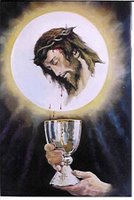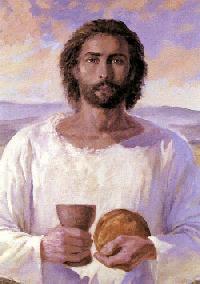"I am the bread of life. Your fathers did eat manna in the desert, and are dead. This is the bread which cometh down from Heaven, that, if any man eat of it, he may not die. I am the living bread which came down from heaven. If any man eat of this bread, he shall live for ever; and the bread that I will give, is My flesh for the life of the world."
John 6:48-52 Corpus Christi Sequenceby St. Thomas Aquinas
Corpus Christi Sequenceby St. Thomas AquinasZion, to Thy Savior sing,
To Thy Shepherd and Thy King!
Let the air with praises ring!
All thou canst, proclaim with mirth,
For far higher is His worth
Than the glory words may wing.
Lo! before our eyes and living
Is the Sacred Bread life-giving,
Theme of canticle and hymn.
We profess this Bread from heaven
To the Twelve by Christ was given,
For our faith rests firm in Him.
Let us form a joyful chorus,
May our lauds ascend sonorous,
Bursting from each loving breast.
For we solemnly record
How the Table of the Lord
With the Lamb’s own gift was blest.
On this altar of the King
This new Paschal Offering
Brings an end to ancient rite.
Shadows flee that truth may stay,
Oldness to the new gives way,
And night’s darkness to the light.
What at Supper Christ completed
He ordained to be repeated,
In His memory divine.
Wherefore now, with adoration,
We, the Host of our salvation,
Consecrate from bread and wine.
Words a nature’s course derange,
That in Flesh the bread may change
And the wine in Christ’s own Blood.

Does it pass thy comprehending?
Faith, the law of light transcending
Leaps to things not understood.
Here beneath these signs are hidden
Priceless things, to sense forbidden;
Signs, not things, are all we see.
Flesh from bread, and Blood from wine,
Yet is Christ in either sign,
All entire confessed to be.
And whoever of Him partakes,
Severs not, nor rends, nor breaks:
All entire, their Lord receive.
Whether one or thousand eat,
All receive the self-same meat,
Nor do less for others leave.
Both the wicked and the good
Eat of this celestial Food:
But with ends how opposite!
With this most substantial Bread,
Unto life or death they’re fed,
In a difference infinite.
Nor a single doubt retain,
When they break the Host in twain,
But that in each part remain
What was in the whole before;
For the outward sign alone
May some change have undergone,
While the Signified stays one,
And the same forevermore.
Hail! Thou Bread of Angels, broken,
For us pilgrims food, and token
Of the promise by Christ spoken,
Children’s meat, to dogs denied!
Shown in Isaac’s dedication,
In the Manna’s preparation,
In the Paschal immolation,
In old types pre-signified.

Jesus, Shepherd mild and meek,
Shield the poor, support the weak,
Pity all who pardon seek,
And who place all trust in Thee,
Fill them with Thy Charity!
Source of all we have or know,
Feed and lead us here below.
Grant that with Thy Saints above,
Sitting at the feast of love
We may see Thee face to face.
Amen. Alleluia.
Labels: calendar, Corpus Christi, Eucharist






